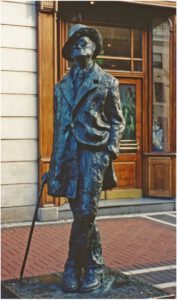I think it’s likely true that the people of all nations love their patriotic songs even when they don’t agree with their message.
I love American patriotic music, although some of the lyrics are much too bellicose and virtually all of it is much too religious for this atheist to embrace. And the music itself may or may not be American. Indeed, the music of one of our most prominent songs, “My Country ‘Tis of Thee,” is the British national anthem “God Save the Queen.” This rendition is sung by Aretha Franklin at Barack Obama’s inauguration:
https://www.youtube.com/watch?v=QW7n8hklwsk
Perhaps more ironic is the fact that our national anthem, “The Star Spangled Banner,” a poem written in praise of our efforts against the English in the War of 1812, is set to the tune of a British drinking song, “The Anacreontic Song.”











